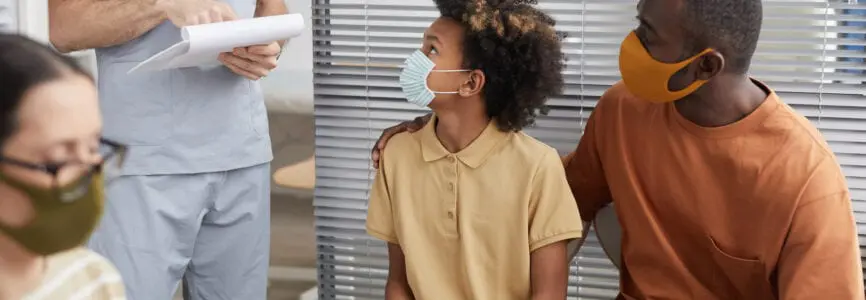Bioethics Forum Essay
Vaccine Hesitancy Is No Excuse for Systemic Racism
As students, professors, and practitioners of medicine, we know that teachable moments are often found outside the classroom walls. We have seen that Black and brown communities are disproportionately impacted by Covid-19. But juxtaposing these disparities with vaccination rates is even more disturbing. Fewer vaccines are going to Black people.
While it’s easy to fall back on vaccine hesitancy as an excuse, systemic racism is to blame. For those of us who are students, it is our particular responsibility to demand a lasting change in course in the profession we will one day lead.
Many city and state health departments partnered with hospitals and private organizations to facilitate distribution of Covid-19 vaccines. Philly Fighting Covid (PFC) is a nonprofit turned for-profit that is now infamous for its failure to live up to its end of one such deal in Philadelphia. PFC’s website allowed anyone to sign up for vaccine appointments regardless of eligibility. The organization’s vaccination clinics frequently turned away eligible 85- and 95-year-olds because of overbooking. At the same time, PFC’s CEO, Andrei Doroshin, admitted to taking vaccines home with him to administer to his girlfriend.
In his pitch to Philadelphia, Doroshin emphasized equitable vaccine distribution to underserved communities, a focus Philadelphia Mayor Jim Kenney has vocally supported. However, pre-established organizations working on pandemic response in those same communities were ignored. One such organization, the Black Doctors COVID-19 Consortium, was started by Ala Stanford, a Black surgeon. Dr. Stanford has prioritized administering vaccines in Black communities on the basis of partnerships with trusted, local organizations. Her team has prior public health experience; Doroshin’s had none.
Kenney only partnered with the Black Doctors COVID-19 Consortium after PFC’s public fall from grace. The PFC scandal might further fuel mistrust and vaccine hesitancy in those same communities that the city of Philadelphia’s administration should be serving. Institutional failures can and do increase reluctance to get vaccinated.
Although major media focuses on mistrust of the Covid-19 vaccine among Black people as an explanation for low vaccination rates in those same communities, the American medical system mistreats Black Americans, not just historically but also in our own day. This is evidenced by the disproportionate burden from Covid-19 that is borne by Black and brown communities. Furthermore, the underfunding of public health leads to fewer interventions prioritizing the health of these communities. Underfunding propagates the notion that Black lives do not matter.
The sluggish vaccine distribution process has moved through Phase 1 and into Phase 2. Once the vaccination window for a particular phase has passed, those who qualified but were not vaccinated are often labeled hesitant. Though rates of Covid-19 infection and death are disproportionately higher in non-white communities, white people have received a majority of vaccine doses. Many vaccine distribution centers are located far away from Black neighborhoods and white individuals are flooding vaccination sites in predominantly Black communities, creating further access barriers.
It is important to place the burden of “trust” where it belongs. The medical system has proven itself untrustworthy and remains so. PFC did not exist in a vacuum; across the U.S., similar stories are emerging of Black Americans eligible for the vaccine but unable to receive it.
It is understandable that Black Americans display “healthy mistrust” of institutions that mistreat them. But this cannot be an excuse for vaccine maldistribution. Local and federal governments must stop confusing hesitancy for policy failures.
Many communities are home to organizations like the Black Doctors COVID-19 Consortium. Vaccination programs should partner with these organizations, not with for-profit groups that lack understanding or history serving Black people. Governments and hospitals must align with community members who are trusted, respected, and qualified to craft vaccine distribution plans and allow them to spearhead the distribution. Within these plans, there must be explicit prioritization for vaccine distribution by race, with Black people at the forefront. Prioritizing just by age or just by occupation leaves many high-risk people behind.
It is easy to scapegoat poor vaccination rates on individuals’ hesitancy and mistrust rather than on the policy failures that have led to massive racial disparities in vaccine distribution. However, in order to guarantee Black communities the vaccine doses they need, we must shift from blaming individuals to implementing equitable policies that place the utmost importance on the needs and health of Black people.
As advocates for health equity, we commit to understanding narratives as thick stories rather than thin recitations of history’s patterns of discrimination. Not only do we commit to teaching, knowing, and sharing these stories but we recognize that, as leaders in our professions, it is up to us to define and carry out our standards for professional ethics and health equity. Most importantly, we will hold privilege accountable when we see it driving policy and demand meaningful, lasting change.
Carissa Lawrence is a PhD student at the Johns Hopkins School of Nursing, Twitter: @LaborofLoveCNM. Divya Manoharan is an MD student at the Johns Hopkins School of Medicine. Zackary Berger, MD, PhD, is an associate professor of medicine at the Johns Hopkins School of Medicine, Twitter: @DrZackaryBerger. Karla Holloway, PhD, is the James B. Duke Professor of English at Duke University and a Hastings Center fellow, Twitter: @ProfHolloway.














Great essay highlighting this very important issues. More needs to be done to ensure black and brown communities have the same access to the vaccine as white communities.
Great essay highlighting this very important issue. More needs to be done to ensure black and brown communities have the same access to the vaccine as white communities.